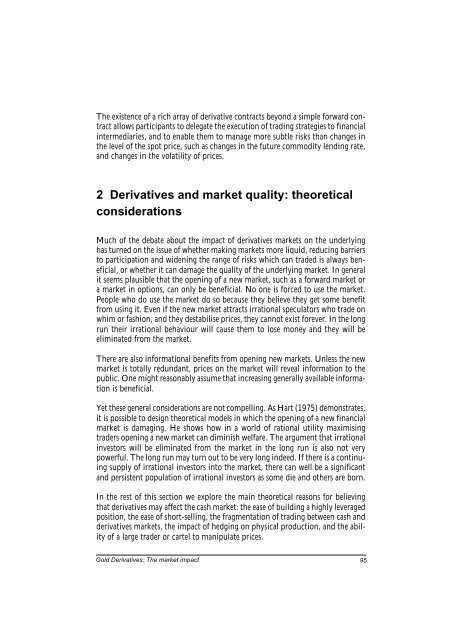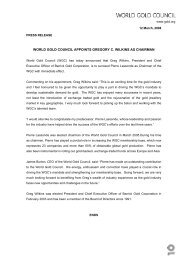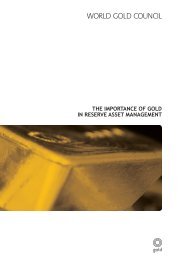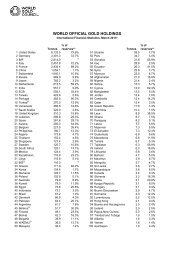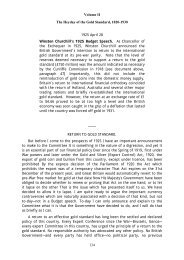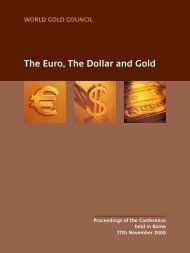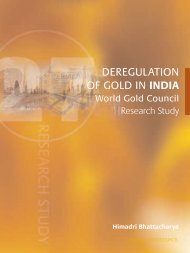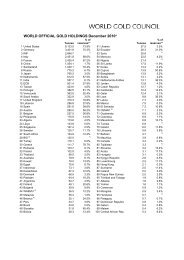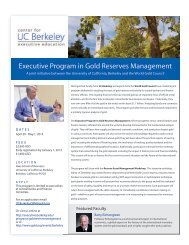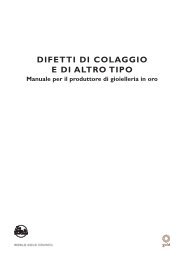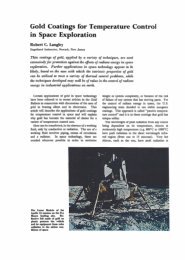Gold Derivatives: Gold Derivatives: - World Gold Council
Gold Derivatives: Gold Derivatives: - World Gold Council
Gold Derivatives: Gold Derivatives: - World Gold Council
Create successful ePaper yourself
Turn your PDF publications into a flip-book with our unique Google optimized e-Paper software.
The existence of a rich array of derivative contracts beyond a simple forward contract<br />
allows participants to delegate the execution of trading strategies to financial<br />
intermediaries, and to enable them to manage more subtle risks than changes in<br />
the level of the spot price, such as changes in the future commodity lending rate,<br />
and changes in the volatility of prices.<br />
2 <strong>Derivatives</strong> and market quality: theoretical<br />
considerations<br />
Much of the debate about the impact of derivatives markets on the underlying<br />
has turned on the issue of whether making markets more liquid, reducing barriers<br />
to participation and widening the range of risks which can traded is always beneficial,<br />
or whether it can damage the quality of the underlying market. In general<br />
it seems plausible that the opening of a new market, such as a forward market or<br />
a market in options, can only be beneficial. No one is forced to use the market.<br />
People who do use the market do so because they believe they get some benefit<br />
from using it. Even if the new market attracts irrational speculators who trade on<br />
whim or fashion, and they destabilise prices, they cannot exist forever. In the long<br />
run their irrational behaviour will cause them to lose money and they will be<br />
eliminated from the market.<br />
There are also informational benefits from opening new markets. Unless the new<br />
market is totally redundant, prices on the market will reveal information to the<br />
public. One might reasonably assume that increasing generally available information<br />
is beneficial.<br />
Yet these general considerations are not compelling. As Hart (1975) demonstrates,<br />
it is possible to design theoretical models in which the opening of a new financial<br />
market is damaging. He shows how in a world of rational utility maximising<br />
traders opening a new market can diminish welfare. The argument that irrational<br />
investors will be eliminated from the market in the long run is also not very<br />
powerful. The long run may turn out to be very long indeed. If there is a continuing<br />
supply of irrational investors into the market, there can well be a significant<br />
and persistent population of irrational investors as some die and others are born.<br />
In the rest of this section we explore the main theoretical reasons for believing<br />
that derivatives may affect the cash market: the ease of building a highly leveraged<br />
position, the ease of short-selling, the fragmentation of trading between cash and<br />
derivatives markets, the impact of hedging on physical production, and the ability<br />
of a large trader or cartel to manipulate prices.<br />
<strong>Gold</strong> <strong>Derivatives</strong>: The market impact 95


